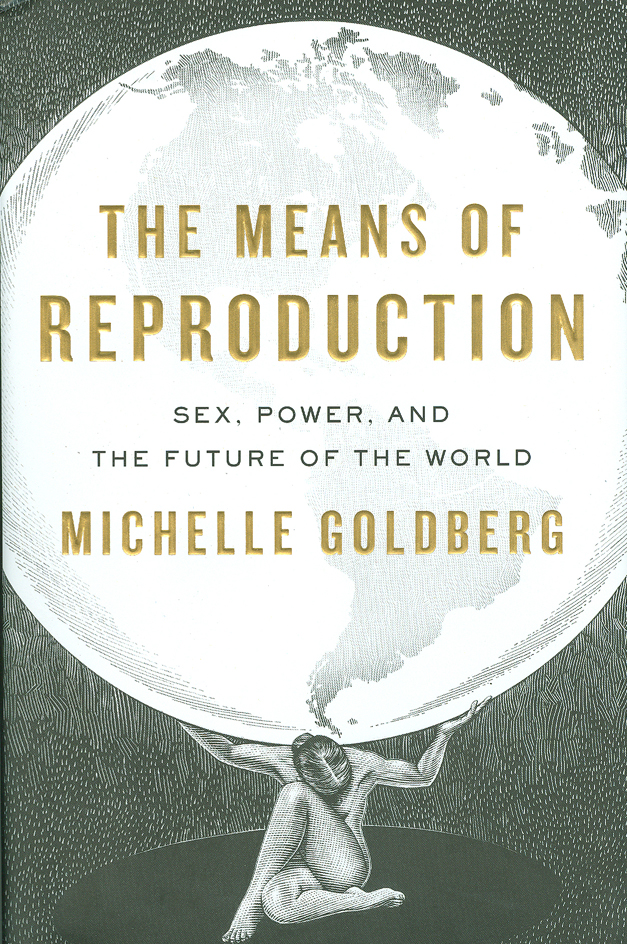INTERVIEW: Population Control for Whom?

INTERVIEW: Population Control for Whom?
A Conversation with Author Michelle Goldberg
Women's rights are often treated as a boutique cause, something for radical feminists to fuss over while those in power focus on issues that "really" matter, like the economy, political stability, or public health. But in her latest book The Means of Reproduction: Sex, Power, and the Future of the World, author Michelle Goldberg explores how women's rights--reproduction, abortion, gender bias, etc.--are at the center of the world's most critical problems, including our economic vitality. Indeed, Goldberg explains how population control measures that began in the 1970s were a misguided American effort to assert control over the global economy and ensure worldwide political stability; how giving women access to birth control and reproductive healthcare helps women gain financial independence and grow the economy; and how both overpopulation and under-population can cripple national economies. Goldberg spoke with I.M.O.W.'s Krista Walton about how empowering women is a solution to the most pressing global issues of our time.
I.M.O.W.: I find it fascinating that the U.S. was so involved in other countries' reproductive policies in the 1960s, especially with population control. Why was population such a hot-button issue for U.S. leaders?
MICHELLE GOLDBERG: This was around the time of the Cold War, and Republicans were concerned about the spread of communism. The politics were very different just a couple of decades ago, which is fascinating: Republicans and those concerned with national security were promoting family planning, because they were convinced that overpopulation was going to cause misery in the developing world and lead to widespread communist revolution. These conservative leaders were employing advisors and holding conferences, trying to convince the governments of poor countries that nothing was more important than getting their population under control.
I.M.O.W.: Did the population control movement ever take women's rights into account?
MICHELLE GOLDBERG: Most of the people working in population control were elites who had very little concern for the autonomy and human rights for the women who would be affected. They could be very callous about the way women made decisions, the lives these women wanted, or why they did or didn't want to have more children.
Then, in the ‘70s, Adrienne Grenier and Joan Dunlop both became involved in population control and worked hard to reform it. They saw that the need for health care, including reproductive care, went far beyond fitting women with an intrauterine device and sending them on their way with no follow-up. They saw the ways in which women's health and rights were being ignored or trampled upon, and began to fight the coercive and dehumanizing aspects of the population control agenda. By working within the system and working with women around the world, they took over from within, and ultimately succeeded in transforming the population control movement into a movement that was devoted to reproductive rights.
I.M.O.W.: Was it for economic reasons that some countries adopted extreme population control measures?
MICHELLE GOLDBERG: Sometimes, certainly. Many of these countries were still developing, and their governments were pushing for a demographic transition from an agricultural economy- in which families have many children and those children provide most of the labor-to an industrial- and technology-based economy, which requires a lot of education and can't really happen with big families in poor countries.
Many believed that high birth rates would slow development. There's a lot of debate over whether this is a chicken-and-egg issue: Is it that you have development and then that brings down birth rates? A lot of people opposed to population control policies would say that development is the best contraceptive; they argued that if you put development first, family size would come down. On the other hand, people supporting population control argued that you're not going to get any development until family size comes down.
I.M.O.W.: While leaders in some countries are encouraging or even forcing women to have fewer children, in other countries they are asking women to have more babies. What's going on here?
MICHELLE GOLDBERG: The concern about declining birthrates in First World countries waxes and wanes, but it hasn't taken on the feeling of an emergency until relatively recently, with the contraceptive revolution. A lot of people thought that once contraceptive use became almost ubiquitous, birth rates would stabilize at around two children per women. Nobody is quite sure why people made this assumption, except that this seems like the number of children that most people wanted at the time.
Instead, birth rates have fallen extremely rapidly in many countries in Europe, as well as in Japan and South Korea. A rapidly declining population will cause problems down the line, in terms of things like pensions and health care, because you're going to have a smaller number of working-age people supporting an ever larger number of retirees.
Declining birth rates also have the potential to affect women's rights in those countries. One fear is that this could lead to a different kind of coercion: rather than coercive population control there will be coercive pronatalism. Many repressive regimes--Nazi Germany, Stalinist Russia, as well as Ceaucescu's Romania--have adopted coercive pronatalism in the past.
It's a really troubling situation, and it can be solved to a certain extent through immigration. But as we can see, that brings up a whole host of other issues. European countries are having existential convulsions as they become immigrant societies. There isn't the same tradition of the melting pot as there is in the U.S. and it's creating an identity conflict as well as backlash.
I.M.O.W.: Don't you think there's a strange dichotomy in encouraging some women to have fewer children and encouraging others to have more?
MICHELLE GOLDBERG: Of course there is! On the one hand, it's indefensible. It smacks of racism, it smacks of fear of a brown planet, it smacks of terror over the fact that demographically European states are becoming a smaller part of the global population and Africa is becoming ever larger. But at the same time, there is also a politically unconscionable reality that nonetheless needs to be addressed, which is that in many places in sub-Saharan Africa, they cannot provide for populations that are basically doubling every generation, and these very high birth rates are taking a toll on women's lives and health. It's contributing to the scandal of maternal mortality where, in some regions, 1 out of every 6 women die in childbirth.
I.M.O.W.: So what's the difference between "population control" and "reproductive rights"?
MICHELLE GOLDBERG: Well, there's a huge difference between getting women to have fewer children by whatever means possible, and a movement where the goal is to improve women's health and increase the control women have over their own bodies.
I.M.O.W.: Is there a way to address the population problem without impinging upon women's rights? How do you think government can best get involved in reproductive issues in a way that actually helps women and isn't intrusive?
MICHELLE GOLDBERG: If you look at all of the research, it's obvious that if one is really worried about quickly declining birth rates, the solution is to increase support for working women and to create more of a welfare state, in the style of France or Scandinavian countries. Birth rates are falling very rapidly in conservative countries where society isn't supporting working women's ambitions to combine work and family.
And then on the other hand--and there's something very elegant about this to me--if you are concerned about unsustainably high birth rates, it turns out that the answer is the same as addressing unsustainably low birth rates: to increase the amount of choice and power and autonomy in women's lives..
When given the choice to go to school or to work outside the home, most women are going to want to be part of a larger economy, as well as part of a family. Most women, when given the choice, do not want to bear nine children into a life of grinding poverty. We've seen over and over what a huge engine for growth and development women can be, how much more responsible they are in terms of paying back small loans, how much more likely they are to invest in their children compared to men. When you raise a woman's income, it has broader social effects than when you raise a man's income.
A fundamental principle has to be: trust women. If you give women the support that they need to make decisions, both about their own economic lives and their own fertility, so many other problems have a way of falling into place. Family planning should be used as a tool of empowerment, as something that absolutely needs to be available to those women who do choose it. You don't need to force women, you don't need to trick them, you don't need to bribe them; you just need to give them opportunities.
To learn more, visit Michelle Goldberg's Web site.



